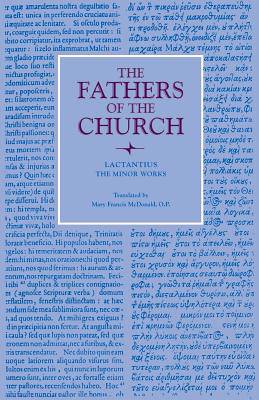
- Retrait gratuit dans votre magasin Club
- 7.000.000 titres dans notre catalogue
- Payer en toute sécurité
- Toujours un magasin près de chez vous
- Retrait gratuit dans votre magasin Club
- 7.000.000 titres dans notre catalogue
- Payer en toute sécurité
- Toujours un magasin près de chez vous
Description
Lactantius lived through one of the greatest turning points in the history of Europe. It has been aptly described as the moment when the old world of paganism was in travail, when against its will it gave birth to the Christian Empire. The writings of this author are, together with those of Eusebius, the principal sources for the period of the great persecution of Diocletian and for the first years of the peace of the Church after the Edict of Milan. For the period of the Council of Nicaea, there is somewhat more abundant source material, but for the years 312-324 reliance must be made upon Eusebius and Lactantius. Both may be considered to have written with considerable bias. They are too extravagant in praise of Constantine; Lactantius especially manifested an odium theologicum toward Galerius and the persecutors. Their works are still of high value, however, as historical sources. From the time of the studies of Maurice, moreover, the evidence of numismatics has verified the historical accounts of these contemporary sources. The writings of Lactantius, therefore, were composed in one of the most eventful epochs of ecclesiastical history. The Church, after suffering the most sever of despotic persecutions, was suddenly received under state protection and began to enjoy, not merely tranquility and legal status, but even a considerable portion of political influence. The fourth century saw the great fusion of the Christian Church with the Roman state and Hellenistic culture, the fusion which was to spell out Western civilization and determine its achievements. Perhaps no other writer is more completely revealing of his own times. As pagan rhetoricians were abandoning the schools and the philosophers, the culture of the world was bring saved in the very Church that was charged with its destruction. Lactantius is a sharer of Minucius Felix' attitude toward traditional culture. He believed that it possessed a vitality, that its treasure should be preserved, that the 'spoils of the Egyptians could become the pride of the despised Galilaeans.' In the very act of despoiling them, however, he assigned himself the task of addressing those Egyptians and, in a number of essential features, accepted their own literature and learning. In this way, he saved much of their culture for the Church and became thereby one of the founders of Christian humanism.
Spécifications
Parties prenantes
- Auteur(s) :
- Editeur:
Contenu
- Nombre de pages :
- 260
- Langue:
- Anglais
Caractéristiques
- EAN:
- 9780813228266
- Date de parution :
- 01-01-65
- Format:
- Livre broché
- Format numérique:
- Trade paperback (VS)
- Dimensions :
- 140 mm x 216 mm
- Poids :
- 331 g







